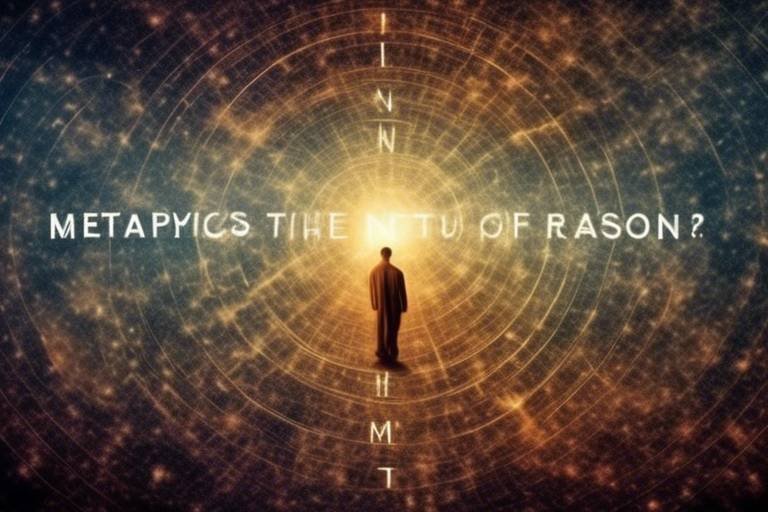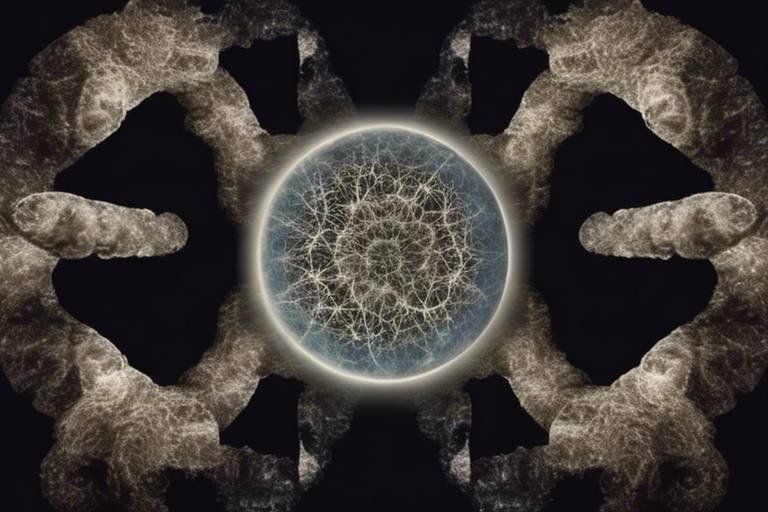The Metaphysics of Human Nature - A Deep Dive
The exploration of human nature through the lens of metaphysics is akin to embarking on a journey into the depths of our very existence. What does it mean to be human? Is our essence defined by our thoughts, our physical form, or something more elusive? These questions have baffled philosophers for centuries and continue to intrigue scholars and curious minds alike. In this article, we will unravel the intricate relationship between metaphysics and human nature, examining philosophical perspectives and key concepts that shape our understanding of what it means to exist in this universe.
At the core of metaphysical inquiry lies the fundamental question of existence itself. What does it mean to exist? This question has profound implications not just for philosophy but also for our everyday lives. To grasp the essence of human existence, we must consider various metaphysical theories that offer different insights. For instance, consider the contrast between existentialism, which emphasizes individual experience and choice, and essentialism, which posits that humans have a predetermined essence. Each perspective provides a unique lens through which we can examine our place in the cosmos.
When we ponder existence, we often find ourselves at a crossroads of thought. Are we simply biological organisms, or do we possess a soul that transcends our physical form? This inquiry leads us to consider how metaphysical theories shape our understanding of consciousness, identity, and the nature of reality itself. The implications are vast and can influence everything from our moral frameworks to our personal relationships.
One of the most compelling discussions in the realm of metaphysics is the concept of mind-body dualism. This theory posits that the mind and body are distinct entities, each with its own properties and functions. Imagine your mind as a conductor orchestrating a symphony, while your body serves as the instruments playing the notes. This separation raises intriguing questions about human identity and consciousness. If the mind can exist independently of the body, what does that mean for our understanding of self?
Throughout history, philosophers have grappled with the mind-body problem, offering various interpretations of this dualistic relationship. From René Descartes, who famously declared "Cogito, ergo sum" (I think, therefore I am), to contemporary thinkers who challenge and refine these ideas, the dialogue surrounding dualism is rich and complex. Descartes' assertion that the mind is a non-physical substance has paved the way for ongoing debates about consciousness, identity, and the nature of reality.
Descartes' dualism posits that the mind, as a thinking substance, is fundamentally different from the body, a physical substance. This separation has profound implications for our understanding of consciousness. If the mind can exist independently, what does that mean for our experiences and perceptions? Cartesian dualism has sparked extensive discussions in metaphysics, psychology, and neuroscience, as scholars seek to understand the intricate dance between thought and physicality.
In recent years, advancements in neuroscience have brought new insights into the mind-body relationship, challenging traditional metaphysical assumptions. Researchers are uncovering the complexities of brain functions and how they relate to consciousness. This has led to modern interpretations of dualism, with some scholars advocating for a more integrated view that acknowledges the interplay between mental and physical processes. The ongoing dialogue highlights the evolving nature of metaphysical inquiries into human existence.
While dualism provides a compelling framework for understanding human nature, alternative metaphysical theories also offer intriguing perspectives. Physicalism, for example, asserts that everything about the mind can be explained through physical processes in the brain. On the other hand, idealism posits that reality is fundamentally mental, suggesting that our perceptions shape existence. Each of these theories invites us to reconsider our assumptions about consciousness and identity, ultimately enriching our understanding of what it means to be human.
The debate between free will and determinism is another critical aspect of metaphysical inquiry that shapes our understanding of human agency. Are our choices truly our own, or are they predetermined by factors beyond our control? This question not only influences our philosophical beliefs but also has profound implications for ethics and moral responsibility. Imagine standing at a crossroads, where every decision you make could lead you down a different path. Do you have the power to choose your direction, or is the path already laid out for you?
The implications of free will versus determinism extend into our views on ethics and accountability. If we are mere products of our environment and biology, can we truly be held responsible for our actions? Conversely, if we possess free will, how do we navigate the complexities of moral decision-making? These questions challenge our understanding of human nature and compel us to reflect on the essence of choice, responsibility, and the moral fabric of society.
Scientific findings, particularly in psychology and neuroscience, have further informed the discourse on free will and determinism. Studies exploring the neurological basis of decision-making have led some to argue that our choices may be influenced by subconscious processes, raising questions about the authenticity of our perceived free will. As we delve into these scientific insights, we find ourselves at the intersection of metaphysics and empirical evidence, navigating the complexities of human nature in a rapidly evolving landscape.
- What is metaphysics? Metaphysics is a branch of philosophy that explores the fundamental nature of reality, existence, and the relationship between mind and matter.
- What is mind-body dualism? Mind-body dualism is the philosophical concept that the mind and body are distinct entities, each with their own properties and functions.
- How does free will relate to human nature? The debate between free will and determinism raises questions about human agency, moral responsibility, and the nature of decision-making.
- What are some alternative theories to dualism? Alternative theories include physicalism, which posits that everything about the mind can be explained through physical processes, and idealism, which suggests that reality is fundamentally mental.

The Nature of Existence
When we ponder the nature of existence, we are diving headfirst into one of the most profound questions humanity has ever faced. What does it truly mean to exist? Is our existence merely a fleeting moment in the vast cosmos, or is there something more profound that ties us to the universe? These questions have perplexed philosophers, scientists, and thinkers for centuries, sparking debates that range from the deeply spiritual to the rigorously scientific.
At its core, the inquiry into existence challenges us to consider our place in the universe. Are we simply biological machines, or do we possess an intrinsic essence that defines our humanity? This is where metaphysical theories come into play, providing various lenses through which we can examine our reality. For instance, metaphysical realism posits that the world exists independently of our perceptions, suggesting that our understanding of existence is shaped by external realities rather than subjective experiences. Conversely, idealism argues that our perceptions and consciousness are fundamental to existence, meaning that reality is, in some way, a construct of our minds.
Consider the implications of these perspectives. If we lean towards metaphysical realism, we might view ourselves as mere observers in a grand cosmic play, where our thoughts and feelings are secondary to the physical world around us. On the other hand, if we embrace idealism, we might see ourselves as active participants in the creation of our reality, where every thought can ripple through the fabric of existence. This dichotomy not only shapes philosophical discourse but also affects how we engage with our daily lives and decisions.
To further explore these concepts, we can break down the nature of existence into several key questions:
- What is the essence of being? Are we defined by our physical bodies, our thoughts, or something beyond?
- How does consciousness fit into the puzzle? Is consciousness a product of our physical brain, or does it exist independently?
- What role does perception play? Can we trust our senses to provide an accurate depiction of reality?
Each of these questions opens up a myriad of discussions, revealing the intricate tapestry of thought that surrounds our existence. Philosophers like Heidegger and Kant have contributed significantly to this discourse, emphasizing the importance of being and experience in understanding our existence. Their works challenge us to consider not just the 'what' of existence, but the 'how' and 'why' as well.
Moreover, the implications of these metaphysical inquiries extend beyond philosophy; they seep into our everyday lives. For instance, our understanding of existence influences our beliefs about purpose, morality, and even our interactions with others. If we view ourselves as interconnected beings within a larger cosmos, we might be more inclined to act with compassion and empathy. Conversely, a more nihilistic perspective might lead to a sense of detachment or apathy towards others.
In conclusion, the nature of existence is not merely an abstract philosophical question; it is a deeply personal inquiry that shapes our understanding of ourselves and the world around us. By exploring these metaphysical perspectives, we can gain insights into what it means to be human, ultimately enriching our lives and our connections with others.

Mind-Body Dualism
Mind-body dualism is a fascinating and complex philosophical perspective that delves into the intricate relationship between our mental states and physical bodies. At its core, dualism posits that the mind and body are fundamentally distinct entities. This idea raises profound questions about the nature of consciousness, identity, and what it truly means to be human. Have you ever pondered whether your thoughts are merely the result of brain activity, or do they represent a deeper, immaterial essence? This tension between the physical and the metaphysical has captivated thinkers for centuries, compelling us to explore the implications of dualism on our understanding of existence.
One of the most influential figures in this discourse is René Descartes, whose famous declaration, "Cogito, ergo sum" (I think, therefore I am), encapsulates the essence of dualistic thought. Descartes argued that the mind, characterized by thought and consciousness, is separate from the body, which is defined by its physical properties. This separation raises compelling questions: If the mind is non-physical, how does it interact with the body? How can something immaterial influence the material world? These inquiries not only challenge our understanding of human nature but also lead us to consider the implications for our moral and ethical frameworks.
Historically, the implications of dualism have been profound. For instance, if we accept that the mind exists independently of the body, it opens up avenues for discussing the afterlife, the soul, and the continuity of consciousness beyond physical death. Yet, this perspective is not without its critiques. Many contemporary thinkers argue that advances in neuroscience and psychology suggest a more integrated view of mind and body, where mental states are intricately linked to brain functions. This brings us to the modern debates surrounding dualism, where some advocate for a more holistic understanding of human nature.
The historical journey of mind-body dualism has seen contributions from various philosophers, each adding layers to the discussion. From Plato's early notions of the soul to Descartes' detailed arguments, the evolution of thought around this topic is rich and diverse. Descartes' dualism, often referred to as Cartesian dualism, laid the groundwork for future explorations of consciousness. He proposed that the mind, a non-extended substance, interacts with the body, which is an extended substance. This interaction, however, remained a point of contention among philosophers and scientists alike.
Descartes' dualism has had a lasting impact on metaphysical inquiries. His belief that the mind could exist independently of the body led to significant implications for our understanding of identity. If our thoughts and consciousness are separate from our physical form, what does that mean for our sense of self? This notion has influenced various fields, including psychology, theology, and ethics, prompting debates about personal identity and moral responsibility. The idea that we are more than just our physical bodies resonates with many, fueling discussions about the essence of being human.
In recent years, the landscape of dualism has evolved dramatically, with advancements in neuroscience challenging traditional views. Contemporary thinkers have begun to question the validity of strict dualism, advocating for perspectives such as physicalism, which posits that everything about the mind can be explained in terms of physical processes. This shift has led to a more integrated understanding of human nature, where mental states are seen as emergent properties of complex biological systems. The ongoing dialogue between dualism and physicalism continues to shape our understanding of consciousness and identity, inviting us to reconsider what it truly means to be human.
In conclusion, the exploration of mind-body dualism is not merely an academic exercise; it has real-world implications for how we view ourselves and our place in the universe. As we navigate the complexities of consciousness, identity, and existence, we must grapple with the fundamental questions that dualism raises. Are we simply biological organisms, or is there something more profound at play? The answers may shape our understanding of morality, ethics, and the human experience for generations to come.
- What is mind-body dualism? Mind-body dualism is a philosophical perspective that posits the mind and body as two distinct entities, each with its own properties and functions.
- Who is the most famous proponent of dualism? René Descartes is often regarded as the most influential proponent of dualism, particularly through his concept of Cartesian dualism.
- What are the implications of dualism for personal identity? Dualism suggests that our identity may extend beyond our physical form, raising questions about the nature of the self and consciousness.
- How do contemporary views challenge dualism? Advances in neuroscience and psychology have led many to argue for a more integrated understanding of mind and body, questioning the validity of strict dualism.

Historical Perspectives
The exploration of mind-body dualism has captivated philosophers for centuries, with its roots tracing back to ancient thinkers and evolving through the ages. One of the most influential figures in this discourse is René Descartes, whose dualistic perspective laid the groundwork for modern metaphysical inquiries. Descartes famously posited that the mind and body are two distinct substances, a view encapsulated in his famous dictum, "Cogito, ergo sum" (I think, therefore I am). This assertion not only emphasizes the primacy of thought but also raises profound questions about the nature of existence and consciousness.
As we journey through history, we encounter a myriad of perspectives that have shaped our understanding of the mind-body problem. Following Descartes, philosophers like Baruch Spinoza and Gottfried Wilhelm Leibniz offered alternative interpretations. Spinoza, for instance, rejected dualism in favor of a monistic view, positing that mind and body are two attributes of a single substance, which he referred to as God or Nature. This radical departure from Cartesian thought invites us to reconsider the relationship between our mental states and physical existence.
In contrast, Leibniz introduced the idea of pre-established harmony, suggesting that the mind and body operate in sync without interacting directly. This notion raises intriguing questions about the nature of causality and whether our thoughts genuinely influence our actions or if they are merely reflections of our physical state. The interplay of these ideas throughout history has created a rich tapestry of philosophical inquiry, each thread contributing to our contemporary understanding of human consciousness and identity.
As we move into the modern era, thinkers like David Hume and Immanuel Kant have further complicated the discourse. Hume challenged the notion of a permanent self, arguing instead that the mind is a collection of perceptions, while Kant sought to reconcile empiricism and rationalism, proposing that our understanding of reality is shaped by both sensory experience and innate concepts. This evolution of thought underscores the dynamic nature of metaphysical discussions surrounding human nature and the mind-body relationship.
In recent decades, the advent of neuroscience has prompted a reevaluation of these historical perspectives. As we delve deeper into the workings of the brain, questions arise about the validity of traditional dualism. Are our thoughts merely byproducts of neural processes? Or is there something more profound at play? The historical perspectives on mind-body dualism continue to resonate today, prompting ongoing debates and inspiring new inquiries into what it truly means to be human.
- What is mind-body dualism? - Mind-body dualism is the philosophical concept that the mind and body are two distinct entities that interact with each other.
- Who is René Descartes? - René Descartes was a French philosopher known for his contributions to modern philosophy and his formulation of dualism.
- What are some criticisms of dualism? - Critics argue that dualism fails to explain how the mind and body interact and that advances in neuroscience suggest a more integrated understanding of consciousness.
- How have historical perspectives shaped modern views on consciousness? - Historical perspectives provide a foundation for contemporary debates, influencing how we perceive the relationship between mental and physical states.

Cartesian Dualism
René Descartes, a towering figure in the realm of philosophy, introduced the concept of Cartesian dualism in the 17th century, proposing a radical idea that fundamentally shaped our understanding of the mind and body. At its core, Cartesian dualism posits that the mind and body are distinct entities, each with its own nature and properties. This separation raises profound questions about the essence of human existence: if the mind is non-physical and the body is physical, how do these two realms interact? Descartes famously stated, "Cogito, ergo sum" or "I think, therefore I am," suggesting that the very act of thinking is proof of one’s existence, highlighting the primacy of the mind over the body.
To delve deeper into Cartesian dualism, it’s essential to understand its implications. Descartes argued that the mind, or the soul, is an immaterial substance that cannot be measured or quantified, while the body is a material substance governed by physical laws. This dualistic approach not only laid the groundwork for modern psychology but also sparked a plethora of debates about consciousness and identity. For instance, if our thoughts and feelings are separate from our physical selves, what does that mean for our sense of self? Can we truly claim ownership of our actions if our minds and bodies are fundamentally different?
Moreover, Cartesian dualism has led to significant discussions in various fields, including neuroscience, ethics, and artificial intelligence. Consider the implications of this dualism in the context of artificial intelligence: if we create machines that can think and learn, do they possess a mind akin to humans, or are they merely sophisticated tools? This question challenges our understanding of consciousness and what it means to be "alive."
Despite its historical significance, Cartesian dualism has faced criticism, particularly in light of advancements in neuroscience that suggest a more integrated view of mind and body. Many contemporary philosophers and scientists argue that the mind cannot exist independently of the brain, proposing alternative theories such as physicalism, which posits that everything about the mind can ultimately be explained in terms of physical processes. This shift in perspective invites us to reconsider our definitions of identity and consciousness.
In conclusion, while Cartesian dualism has undeniably influenced our philosophical landscape, it also opens up a myriad of questions that continue to intrigue thinkers today. As we grapple with the complexities of human nature, the dialogue between the mind and body remains a critical area of exploration, urging us to seek a deeper understanding of what it truly means to be human.
- What is Cartesian dualism? Cartesian dualism is the philosophical concept introduced by René Descartes that posits the mind and body as two distinct entities.
- How does Cartesian dualism affect our understanding of consciousness? It suggests that consciousness is a non-physical substance separate from the physical body, leading to debates about the nature of identity and self-awareness.
- What are some criticisms of Cartesian dualism? Critics argue that advancements in neuroscience indicate that the mind cannot exist independently of the brain, challenging the dualistic separation.
- How does Cartesian dualism relate to modern technology? It raises questions about artificial intelligence and whether machines can possess a mind similar to humans.

Contemporary Views
In the realm of metaphysics, the discussion surrounding mind-body dualism has evolved significantly, especially in contemporary philosophy. Today, thinkers are increasingly questioning the traditional dualistic perspective that separates the mind and body into distinct entities. Instead, many contemporary philosophers advocate for a more integrated understanding of human nature, one that acknowledges the complex interplay between our mental states and physical existence. This shift is largely influenced by advancements in neuroscience, which have provided compelling evidence that challenges the strict boundaries of dualism.
One of the prominent contemporary views is physicalism, the idea that everything about the mind can ultimately be explained in physical terms. Physicalists argue that mental states are nothing more than brain states, suggesting that our thoughts, feelings, and consciousness are all products of our biological processes. This perspective aligns with the findings in neuroscience that demonstrate how changes in brain activity correlate with changes in mental states. For instance, studies using neuroimaging techniques like fMRI have shown that specific thoughts and emotions activate particular areas of the brain, reinforcing the idea that our mental experiences are deeply rooted in our physical being.
Conversely, idealism presents a different angle, positing that reality is fundamentally mental. Idealists argue that the material world is a manifestation of consciousness, thus placing the mind at the center of existence. This view raises intriguing questions about the nature of reality and our perception of it. If reality is shaped by our consciousness, then understanding human nature involves delving into the depths of our mental processes and subjective experiences. This perspective invites us to consider how our beliefs, perceptions, and emotions shape our understanding of the world around us.
Moreover, contemporary discussions often explore the implications of these metaphysical views on issues like identity and consciousness. For example, if physicalism holds true, then our sense of self may be seen as a byproduct of our brain's functioning rather than something transcendent or eternal. This challenges traditional notions of identity, prompting us to rethink what it means to be 'us.' On the other hand, idealism suggests that our consciousness might extend beyond our physical bodies, opening up fascinating possibilities regarding life, existence, and even the afterlife.
As we navigate these contemporary views, it's essential to recognize that the conversation is ongoing. Philosophers are not only debating these theories but also incorporating insights from various disciplines, including psychology and cognitive science, to enrich their understanding of human nature. This interdisciplinary approach allows for a more holistic view of what it means to be human, bridging the gap between the physical and the mental.
In conclusion, the contemporary landscape of metaphysical thought presents a rich tapestry of ideas regarding the mind-body relationship. Whether through the lens of physicalism or idealism, the exploration of these concepts invites us to engage with the fundamental questions of existence and consciousness. As we continue to unravel the complexities of human nature, we may find that the answers we seek lie not in rigid categorizations but in the dynamic interplay of mind and body.
- What is mind-body dualism? Mind-body dualism is the philosophical view that the mind and body are fundamentally distinct entities, each with its own properties and functions.
- How does physicalism differ from idealism? Physicalism asserts that everything about the mind can be explained in physical terms, while idealism posits that reality is fundamentally mental and shaped by consciousness.
- What role does neuroscience play in contemporary metaphysical discussions? Neuroscience provides empirical evidence that informs and sometimes challenges traditional metaphysical views, particularly regarding the relationship between mental states and brain activity.
- Can consciousness exist independently of the body? This question is central to debates between dualists and physicalists, with different views on whether consciousness is a product of physical processes or an independent entity.

Alternative Theories
When we dive into the fascinating realm of metaphysics, we encounter a variety of perspectives that challenge the traditional notions of human nature and consciousness. While mind-body dualism offers a compelling viewpoint, alternative theories such as physicalism and idealism present intriguing alternatives that reshape our understanding of what it means to be human.
Physicalism, for instance, posits that everything that exists is physical, and that mental states are ultimately reducible to physical processes. This theory suggests that our thoughts, emotions, and consciousness are not separate from our biological makeup but are instead products of the brain's complex functions. Imagine your mind as a computer: the hardware (your brain) runs the software (your thoughts and feelings). This analogy illustrates how physicalism views mental phenomena as dependent on the physical state of the brain.
On the other hand, idealism takes a radically different stance. It asserts that reality is fundamentally mental and that the material world is either an extension of the mind or entirely constructed by it. This perspective can be quite mind-bending—if we consider that our perceptions shape our reality, it raises questions about the nature of existence itself. What if the world we experience is merely a projection of our consciousness? Idealism invites us to rethink the boundaries between the mind and the external world.
Both physicalism and idealism offer substantial implications for understanding human nature. For example, if we embrace physicalism, we might become more inclined to view mental health issues as biological conditions that can be treated through medical interventions. Conversely, if we lean towards idealism, we may prioritize psychological therapies that focus on altering perceptions and beliefs as a means to achieve well-being.
To further illustrate these concepts, let's take a look at a comparison table that summarizes the key differences between physicalism and idealism:
| Theory | Key Concept | Implications for Human Nature |
|---|---|---|
| Physicalism | Everything is physical; mental states are reducible to physical processes. | Emphasizes biological and medical approaches to mental health. |
| Idealism | Reality is fundamentally mental; the material world is a construct of the mind. | Focuses on psychological and perceptual approaches to well-being. |
As we explore these theories, we must also consider the implications they carry for our understanding of consciousness. If our thoughts are merely the result of physical processes, what does that mean for our sense of self? Are we merely biological machines, or is there something more profound at play? The tension between these theories highlights the complexity of human nature and the ongoing philosophical debate surrounding our existence.
In conclusion, alternative theories like physicalism and idealism challenge us to rethink our assumptions about consciousness and identity. They invite us to explore the intricate relationship between the mind and body, urging us to question what it truly means to be human. As we continue to unravel these metaphysical mysteries, we may find ourselves not only redefining our understanding of humanity but also discovering new pathways to enhance our existence.
- What is physicalism? Physicalism is the belief that everything that exists is physical, and mental states are reducible to physical processes.
- What is idealism? Idealism is the philosophical view that reality is fundamentally mental, and the material world is either a projection of the mind or constructed by it.
- How do these theories affect our understanding of consciousness? Physicalism suggests consciousness arises from physical processes, while idealism posits that consciousness shapes reality.
- Are there practical implications for mental health? Yes, physicalism may lead to biological treatments, whereas idealism may focus on psychological therapies.

Free Will vs. Determinism
The debate between free will and determinism is one of the most captivating discussions in philosophy, and it has profound implications for how we perceive ourselves and our actions. At its core, this debate questions whether humans have the ability to make choices that are free from external constraints or if our actions are predetermined by a series of prior events and conditions. Imagine you're playing a video game—do you control your character's every move, or is the game on autopilot, leading you through a series of scripted events? This analogy captures the essence of the free will versus determinism debate.
On one hand, proponents of free will argue that individuals possess the capacity to make choices independent of external influences. This perspective is often tied to concepts of moral responsibility. If we are indeed free to choose, then we can be held accountable for our actions. For example, if someone chooses to help a stranger in need, they should be praised for their altruism. This viewpoint aligns with many religious and ethical frameworks that emphasize personal responsibility and the importance of individual choice.
Conversely, the deterministic viewpoint posits that every action is the result of preceding events, which can include biological, environmental, and social factors. Think of it like a domino effect: one event triggers another, leading to a cascade of outcomes that ultimately shape our decisions. This perspective raises questions about the very nature of moral responsibility. If our choices are merely the result of a long chain of causation, can we truly be held accountable for our actions? This line of thinking is particularly compelling in light of scientific discoveries that suggest our behavior is influenced by genetics and brain chemistry.
To further illustrate this dichotomy, consider the following table that summarizes key differences between free will and determinism:
| Aspect | Free Will | Determinism |
|---|---|---|
| Definition | Ability to choose freely | All events are determined by preceding causes |
| Moral Responsibility | Individuals are accountable for their actions | Accountability is questionable |
| Philosophical Supporters | Existentialists, Theists | Behaviorists, Some Scientists |
As we delve deeper into this debate, it becomes clear that both perspectives offer valuable insights into human nature. The implications of free will are empowering; they suggest that we are the architects of our own destinies. However, the deterministic perspective serves as a sobering reminder of the myriad factors that influence our choices. It invites us to consider the complexities of human behavior and the extent to which we are shaped by forces beyond our control.
Ultimately, the question of free will versus determinism may not have a definitive answer. Perhaps, like many philosophical inquiries, it is less about arriving at a conclusion and more about the journey of exploration. Engaging with these ideas can enrich our understanding of ourselves and the world around us. So, as we navigate through life, let’s ponder: are we the masters of our fate, or are we simply players in a grand, predetermined play?
- What is free will? Free will is the ability to make choices that are not determined by prior causes or external factors.
- What is determinism? Determinism is the philosophical view that all events, including human actions, are ultimately determined by causes external to the will.
- Can we be morally responsible if determinism is true? This is a contentious issue; some argue that moral responsibility requires free will, while others believe we can still hold individuals accountable within a deterministic framework.
- How do neuroscience findings impact the debate? Neuroscience suggests that many of our decisions are influenced by brain activity that occurs before we are consciously aware of them, challenging traditional views of free will.

Philosophical Implications
The debate between free will and determinism has profound philosophical implications that ripple through our understanding of ethics, accountability, and the very essence of human decision-making. At its core, this discussion challenges us to consider whether our choices are genuinely ours or merely the result of predetermined factors. Imagine standing at a crossroads, where one path represents free will—where you have the power to choose your destiny—and the other signifies determinism, where every step you take is already laid out by past events and external influences. Which path do you feel is more reflective of your reality?
In a world that leans towards determinism, the idea of moral responsibility comes into question. If our actions are the result of a chain of events beyond our control, can we truly hold individuals accountable for their choices? This dilemma invites us to reconsider the foundations of justice and punishment. For instance, if a person commits a crime due to a series of uncontrollable circumstances, should they be punished in the same way as someone who acted with full agency? This brings us to the ethical frameworks that underpin our legal systems and societal norms.
On the other hand, embracing free will suggests that we are the architects of our lives, capable of making choices that shape our futures. This perspective fosters a sense of empowerment and personal responsibility, encouraging individuals to strive for better outcomes. However, it also raises questions about the influence of external factors—such as upbringing, culture, and social environment—on our decision-making processes. Are we truly free if our choices are heavily influenced by these factors? Herein lies a paradox that philosophers grapple with, as they attempt to delineate the boundaries between autonomy and influence.
Furthermore, the implications of free will versus determinism extend into the realm of ethics. Consider the following:
- Consequentialism: This ethical theory posits that the morality of an action is determined by its outcomes. If determinism holds true, can we evaluate actions based solely on their consequences without considering the agent's intention?
- Deontology: This approach emphasizes duty and rules. If free will exists, individuals are expected to act according to moral laws. But what happens when those laws conflict with the deterministic view of human behavior?
As we navigate these philosophical waters, the intersection of free will and determinism influences not only our moral frameworks but also our psychological well-being. Understanding our agency—or lack thereof—can significantly affect how we approach life’s challenges. For instance, those who believe in free will may be more inclined to take risks and pursue their goals, while those who lean towards determinism might adopt a more passive attitude, feeling that their efforts are futile against the tides of fate.
In summary, the philosophical implications of the free will versus determinism debate are vast and complex. They challenge us to rethink our beliefs about human nature, responsibility, and ethics. As we delve deeper into these concepts, we must ask ourselves: Are we the authors of our own stories, or are we merely characters in a narrative written by the universe? This inquiry is not just academic; it resonates with our everyday lives, shaping how we understand ourselves and our place in the world.
- What is the difference between free will and determinism?
Free will refers to the ability to make choices unconstrained by external factors, while determinism suggests that every event, including human actions, is determined by preceding events in accordance with the natural laws. - How does determinism affect moral responsibility?
If determinism is true, it raises questions about whether individuals can be held morally responsible for their actions, as those actions may be the result of factors beyond their control. - Can free will and determinism coexist?
Some philosophers argue for a compatibilist view, suggesting that free will can exist within a deterministic framework, allowing for personal responsibility while acknowledging the influence of external factors.

Scientific Perspectives
When we delve into the realm of free will versus determinism, we can't overlook the profound influence that scientific findings have on this philosophical debate. The advancements in psychology and neuroscience have opened up new avenues for understanding the intricacies of human behavior and decision-making. For instance, studies in brain activity have shown that our brains can begin to initiate actions even before we consciously decide to perform them. This raises the tantalizing question: are we really the masters of our own fate, or are we merely puppets dancing to the strings of our neural pathways?
Neuroscientific research has provided compelling evidence that suggests our thoughts and choices may be heavily influenced, if not determined, by biological and environmental factors. A notable experiment conducted by Benjamin Libet in the 1980s demonstrated that there is a measurable brain activity that precedes conscious decision-making. Participants were asked to perform a simple task while their brain activity was monitored. The results indicated that the brain's readiness potential occurred several hundred milliseconds before the participants reported being consciously aware of their intention to act. This finding has led to heated discussions about the nature of consciousness and whether we possess true free will.
Moreover, the field of psychology offers insights into how our environment and upbringing shape our decisions. Behavioral psychology, for instance, posits that our choices are significantly influenced by past experiences and conditioning. This perspective aligns with determinism, suggesting that our actions are responses to external stimuli rather than products of autonomous will. The implications of these findings are profound, as they challenge the very foundation of our moral and ethical frameworks. If our decisions are predetermined by a complex interplay of genetics and environment, what does that mean for our sense of accountability?
To further illustrate the intersection of science and philosophy, consider the following table summarizing key scientific findings related to free will and determinism:
| Study | Key Findings | Implications |
|---|---|---|
| Libet's Experiment (1980s) | Brain activity precedes conscious decision-making. | Challenges the notion of free will. |
| Neuroscience of Decision-Making | Decisions can be predicted based on neural patterns. | Supports deterministic views. |
| Behavioral Psychology | Past experiences shape present choices. | Highlights environmental influence on behavior. |
As we navigate through these scientific perspectives, it becomes evident that the conversation around free will and determinism is not merely an abstract philosophical debate; it is a reflection of our understanding of what it means to be human. The more we learn about the brain and its functions, the more questions arise about our autonomy and moral responsibility. Are we the architects of our own lives, or are we simply the products of our biology and experiences? These questions not only spark curiosity but also challenge us to reconsider our assumptions about human nature.
In essence, the scientific exploration of free will and determinism invites us to engage in a deeper dialogue about our existence. It encourages us to ponder the extent to which we control our destinies and the implications this has for our understanding of ethics and accountability. As we continue to unravel the complexities of the human mind, we must remain open to the possibility that our traditional notions of free will may need to evolve in light of new evidence.
- What is the main argument for determinism? Determinism suggests that all events, including human actions, are determined by preceding events in accordance with the natural laws.
- How does neuroscience challenge the concept of free will? Neuroscience has shown that brain activity related to decision-making occurs before we consciously make a choice, suggesting that our decisions may be predetermined.
- Can free will and determinism coexist? Some philosophers argue for a compatibilist perspective, suggesting that free will can exist within a deterministic framework.
- What are the ethical implications of determinism? If our actions are determined by factors beyond our control, it raises questions about moral responsibility and accountability.
Frequently Asked Questions
- What is metaphysics and how does it relate to human nature?
Metaphysics is a branch of philosophy that explores the fundamental nature of reality, including concepts such as existence, being, and the universe. When it comes to human nature, metaphysics seeks to understand what it means to be human, examining our consciousness, identity, and the essence of our existence in a broader context.
- Can you explain mind-body dualism?
Mind-body dualism is the philosophical view that the mind and body are distinct entities. This perspective suggests that mental phenomena are non-physical and that our consciousness exists separately from our physical form. This idea raises intriguing questions about identity and how we perceive ourselves as beings with both a mind and a body.
- What are some historical perspectives on the mind-body problem?
Historically, philosophers like René Descartes have significantly influenced our understanding of the mind-body problem. Descartes posited that the mind is a non-material substance, which led to extensive discussions and debates about how the mind interacts with the physical body. Contemporary thinkers have built upon or challenged these ideas, leading to a rich tapestry of philosophical inquiry.
- How do contemporary views differ from Cartesian dualism?
Contemporary views often challenge Cartesian dualism by integrating insights from neuroscience, which suggest that mental states are closely tied to physical brain processes. This has led to alternative theories like physicalism, which posits that everything, including consciousness, can be explained in terms of physical processes.
- What is the debate between free will and determinism?
The debate between free will and determinism revolves around whether humans have the ability to make choices or if our actions are determined by prior causes. This discussion has profound implications for concepts like moral responsibility, ethics, and the nature of human agency.
- How do scientific perspectives inform the free will vs. determinism debate?
Scientific findings, particularly in psychology and neuroscience, provide insights into human behavior and decision-making. Some studies suggest that our choices may be influenced by unconscious processes, raising questions about the extent of our free will. This ongoing dialogue between science and philosophy enriches our understanding of human nature.



















